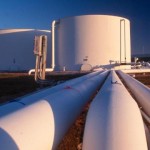Natural gas erased its daily losses but remained firmly on negative weekly basis after two reports by the Energy Information Administration this week showed that U.S. natural gas inventories rose above the average in the preceding two weeks. Short-term forecasts for colder than usual weather in key consuming areas of the U.S. supported prices.
On the New York Mercantile Exchange, natural gas for delivery in November traded at $3.646 per million British thermal units at 12:19 GMT, up 0.47% on the day. Prices held in range between days high and low of $3.654 and $3.594 per mBtu respectively. The fuel added 0.4% on Thursday and trimmed its weekly decline to 3.2% on Friday.
The Energy Information Administration reported on Thursday that U.S. natural gas inventories added 87 billion cubic feet in the week ended October 18, surpassing the median estimate of seven analysts surveyed by Bloomberg for an 82 billion increase. Last weeks build also exceeded the five-year average increase of 67 billion cubic feet and last years 64 billion increase during the comparable week.
Total gas held in underground U.S. storage hubs now equaled 3.741 trillion cubic feet, 2.1% below last years 3.833 billion. The surplus over the five-year average inventories of 3.644 trillion cubic feet widened by 0.5% to 2.1% from the preceding week.
The report also showed that stockpiles in the Producing Region were 9.3% above the five-year average of 1.139 trillion cubic feet following a net injection of 33 billion cubic feet. Supplies in the East region rose by 50 billion to 1.947 trillion and were 3.9% below the five-year average of 2.027 trillion cubic feet.
Teri Viswanath, director of commodities strategy at BNP Paribas SA in New York, said for Bloomberg: “It is all demand-driven at this point, as supplies continue to build. Luckily, we are entering our peak demand period when these supply gains will eventually be less noticeable.”
The negative supply data was offset as near-term weather forecasts called for colder-than-usual weather across most of the U.S. Commodity Weather Group LLC reported that temperatures on the East Coast and in the central U.S. will be below-usual through October 28 and the Midwest will experience unusually cold weather through November 2. According to AccuWeather Inc., temperatures in Washington on October 28 may bottom at 44 degrees Fahrenheit, 3 below usual, while the low in Minneapolis on October 29 may fall to 33 degrees, 2 below normal.
When cool weather is expected, natural gas surges as increased electricity demand to power air-conditioning calls for more supply of the fuel, which is used for a quarter of the U.S. electricity generation. Consumption usually picks up from November through March. According to the Energy Information Administration, power generation accounts for 32% of U.S. gas demand and 49% of U.S. households use the energy source for heating.
According to a Bloomberg survey of analysts, natural gas is expected to surge next week. Eight of 14 participants polled, or 57%, wagered that prices will gain, while four were bearish and two projected no significant change.





